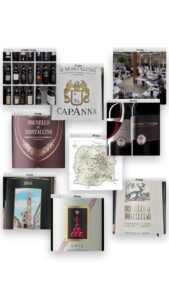After Benvenuto Brunello “OFF”, the first preview of the year which was in March, an additional edition of Benvenuto Brunello was organized for the press from the 16th and the 17th May dedicated to the Tuscan wine previews “Anteprime di Toscana”. Thanks to the diligence of the Consortium Brunello di Montalcino, the tastings took place in-person in the heart of Montalcino village in the beautiful Monastery of Sant’Agostino. Forty kilometers south of the city of Siena, Montalcino is a stunning hilltop town in the heart of Tuscany. With rolling hills and farmland of rare beauty, the village’s distinctive mount is encircled by forest. Vineyards and olive groves fill the countryside and many historical stone buildings are witness to centuries of cultivation in this area. Montalcino and the villages of Castelnuovo dell’Abate, Sant’Angelo, and Torrenieri are picturesque hamlets with an overall population of just over five thousand inhabitants. This territory is of particular historical character, having never lost touch with the cultural heritage and traditions.
It is important to note that this DOCG is among the wine-growing areas with the highest organic incidence in Italy.
Following safety protocols, the capacity of participants was extremely limited and ensured proper distance between persons. All journalists and writers were called to taste and evaluate the last vintages released on the market: Rosso di Montalcino 2019, Brunello di Montalcino 2016, and Brunello di Montalcino Riserva 2015. We can say that this edition of Benvenuto Brunello will surely remain a memory in each of our minds, not only for the outstanding organization that the consortium put on stage but also for the combination of two remarkable vintages.
Both 2016 and 2015 had exceptional conditions in the vineyard and produced wines of absolute complexity and longevity.
The vintage 2016 was outstanding in terms of balance. Rainfall throughout the winter into the beginning of the spring was consistently average. After the blooming, rains in July set the perfect conditions for a great vintage. Summer shifted from not so high temperature (max 32°) to very chilly nights (min 13°), diurnal moderate temperatures alternated to night precipitation, which offered the wines an amazing structure, complexity, and aroma. The maturation took longer, a fundamental factor both for the different layers of the aroma and the quality of the tannins (especially in the Sangiovese grape and for long lasting wines)

The 2015 vintage was characterized by a cool winter preceded by an irregular spring, which continued with a hot growing season during the summer with adequate rain. Harvest brought limited rainfall and good ventilation which favoured the last stages of ripening of the bunches up to harvest…..continues .. https://bit.ly/3zbCDJR.
I have missed my friends and colleagues during this Benvenuto Brunello but I really hope that was the preview of the restart, once again in-person hopefully we will be able to discover this beautiful wine paradise in the near future.
Always a big thank to my collegue and friend Liz Palmer !
#wine #winetasting #winenews #italy #tastingnotes #winewriter #winejournalist #winetourism #winetravels #benvenutobrunello #brunello #AnteprimediToscana #Montalcino #wine #winetasting #wineblog #wineblogger #winelover #winestagram #winecritic #wineevent #vino #winetime #wineoclock #winewinewine @brunellodimontalcino #montalcino #brunellodimontalcino #benvenutobrunello #italianwine #redwine #brunellowinestage @filippomagnaniwine





